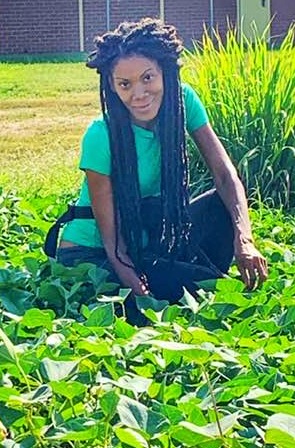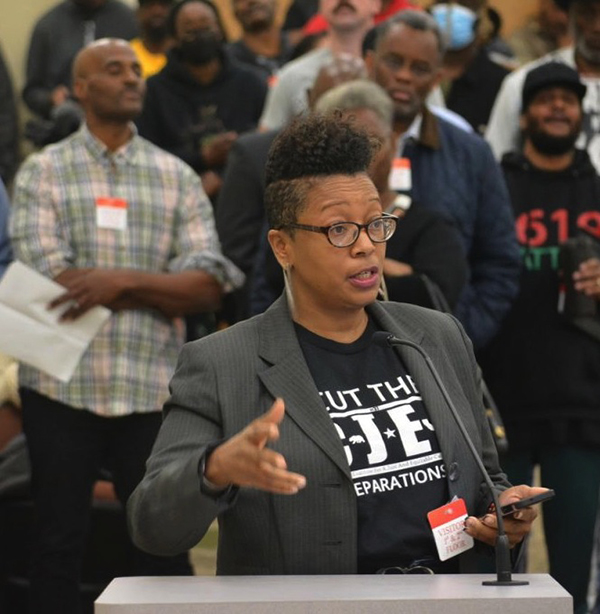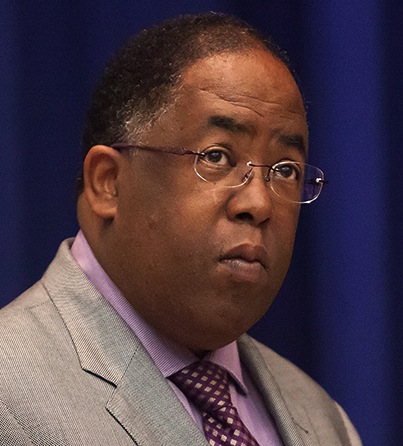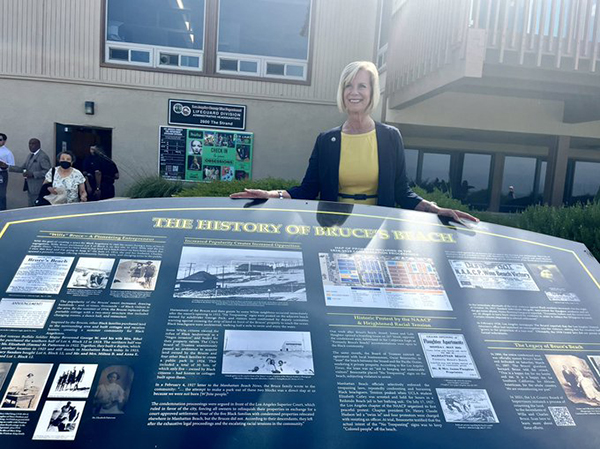By Darlene Donloe
Contributing Writer
SOUTH LOS ANGELES — Doreen Haywood and Vanessa Cain don’t mind getting their hands dirty.
The two friends enjoy tilling the soil until the fruits — and vegetables — of their labor peek through the dirt on their way to someone’s dinner table.
Veteran agriculturalists, Haywood, known in the community as Amaechina, and Cain are two members of Black Women Farmers of Los Angeles, a group of women who seek to nourish individuals and communities, especially those that have limited access to fresh, organic, nutrient-dense local produce.
The group, started by Haywood in December 2019, is comprised of Black women (Cyntrea Cotton, Joanna Cain, Gwenna Hunter and Saquia Jordan) who are dedicated to their regenerative practices, designed to liberate people, animals and restore the planet. The women understand that city farming, now touted as a sustainable solution, has become part of the rise in urban agriculture.
Black Women Farmers of L.A. utilizes Vanguard Learning Center’s Community Garden, located near 132nd and San Pedro streets in Willowbrook, where all of the members have several plots.
Haywood, 66, who oversees the school’s garden, said part of her responsibility is to engage with school principals in the area to encourage teachers to bring their students so she can teach them about gardening and farming.
To sustain the garden, Haywood regularly seeks funding through grants for infrastructure and for a van so her group can deliver fresh produce within the surrounding community.
“Not having our own land, or a van or other essentials is a real problem,” Haywood said. “Those of us who maintain the garden, don’t get a salary. We keep it going, but we don’t get an income. I think the city should be responsible for that. The garden is thriving. We’re providing. There are so many food deserts that lack the basic fresh fruits and veggies.
“It’s not enough to tell a community about fruits and veggies,” Haywood added. “It’s about showing them so they can sustain themselves.”
“The Vanguard Community Garden opened in June 2019,” Haywood said. “At the time there was no limit to the number of plots you could have. I’ve had multiple sclerosis for 31 years. I didn’t know my capacity so I started off small to see what I can do. I was able to do everything and kept adding on another plot. I now have nine 13-by-15-foot plots.”
Community gardens, a beneficial addition to neighborhoods, are plots of land, usually in urban areas, that are rented by individuals or groups for private gardens or are for the benefit of the people caring for the garden. By increasing the availability of nutritious foods, the gardens can ease some of the food insecurity issues in urban areas.
Urban farming could help feed a quickly growing world population because many of the predicted 9 billion people on the planet (by 2050) are increasingly headed to cities.
Haywood and Cain, 61, recognized that there was a lack of accessibility to good, nutritious food available to the people of their community and took it upon themselves to prove that it is possible to eat good-tasting foods that are also healthy.
About 15% of the world’s food is now produced in urban areas. According to the U.N. Food and Agriculture Organization, urban farms already provide food to about 700 million residents of cities, representing about a quarter of the world’s urban population.
By 2030, 60% of people in developing countries will possibly live in cities.
Black Women Farmers of Los Angeles’ efforts are to grow organic produce and encourage food impartiality in their communities and revitalize urban land.
The group works with corporations, restaurants, schools, groups, families and individuals. Services include garden consultation, building gardens, teaching gardening, garden maintenance, hosting events at their garden and doorstep delivery, meal planning, meal preparation, organically and locally grown herbs, vegetables and edible flowers.
Haywood’s and Cain’s desire is for more Black people, especially women to have an interest in farming. Haywood regularly boasts a harvest, or what she calls a “blessing” of watermelon, radishes, multi-colored beets, sweet peas, broccolini, cilantro, red onions and peppermint.
In the beginning, she grew food for her own consumption. Then, she decided “to grow to give.”
“We give away about 70% of what we grow,” Haywood said. “On the fourth Tuesday of every month, we give away big bags of food. We have about 19 different vegetables.
“I encourage everyone to come to the garden,: she continued. “There weren’t a lot of Blacks. We were by ourselves, primarily women. We needed to work together to maximize. That’s when Vanessa (Cain), my niece and another friend came on board. We all decided to work together.”
Haywood said out of 171 plots available at the garden, 40% are used by Blacks, while 60% are being used by Latinos. Both numbers recently increased by 10%.
“I noticed all the Latinos were working together,” she said. “We’re making an effort to get more Blacks excited about farming.”
The Black Women Farmers of Los Angeles, supported in part by Five Points Youth Foundation, regularly hosts “Tour, taste and take” events where they invite friends, family and the community to the garden to get them excited about fresh food. The group also has received support in the form of grants from Mercy for Animals and NutritionFacts.org.
“We did a tour plot by plot,” Haywood said. “When it came to the vegetables, we wanted them to smell it, taste it and feel it. Then, they would be able to take something home with them. We showed them how to pick things themselves. They are reconnecting with nature.
“It’s transformative,” she added. “Some of them were astonished at how food fresh from the garden tastes. People are so used to food from the grocery store.”
Haywood said the group is educating while farming.
“Most people can’t recognize what the plant is,” she said. “I could understand it when I started growing peanuts. I didn’t know how peanuts grew. They are being educated on what fresh food tastes like.”
One of Haywood’s goals is to have an edible schoolyard in partnership with a school like the one developed in Berkeley by Chef Alice Waters. The result would be a garden that would flourish as a rich learning environment, while a kitchen classroom would bring everyone to the table to share.
“We’d like to see that,” Haywood said. “It’s our longtime goal to do the same thing. You can change a whole generation. Look at all the universities that have land — and they just have grass. Put it to good use.
“Another goal of mine is to have a garden everywhere,” she added. “It can transform a whole neighborhood. Every school and corporation that has land can feed these communities.”
Haywood, who at one time both hired and fired Cain as a chef for a festival, brought her into the group because she knew she had a long history of farming.
Cain, who also owns the Florence Mail Box & Business Center International is “all in” when it comes to farming.
“There was never a time I didn’t farm,” she said. “I love it. It gives me an opportunity to interact with people. It’s an act of divinity to me.
“I’m putting my hands in the land and understanding the struggle of Black folks,” she added. “It’s a peaceful thing for me. Farming gives me peace of mind. When you’re in the garden, you don’t hear anything else. You’re working, tilling the soil.
“You’re totally removed from anything else. It’s a peaceful place. When I’m there, I’m doing right by my health.”
Haywood also feels a connection to the soil.
“I’m emotional about this,” she said. “It has given me a new life. Being in touch with the soil, air and wind. It’s life-giving. I say, ‘thank you, teach me.’ I’m listening to the ancestors when I step on the grounds. You learn so much about yourself when you connect with the soil.”
“It gives you a sense of pride in knowing that this is something I can do,” Cain said. “I know where my food is coming from.”
Darlene Donloe is a freelance reporter for Wave Newspapers who covers South Los Angeles. She can be reached at ddonloe@gmail.com.












